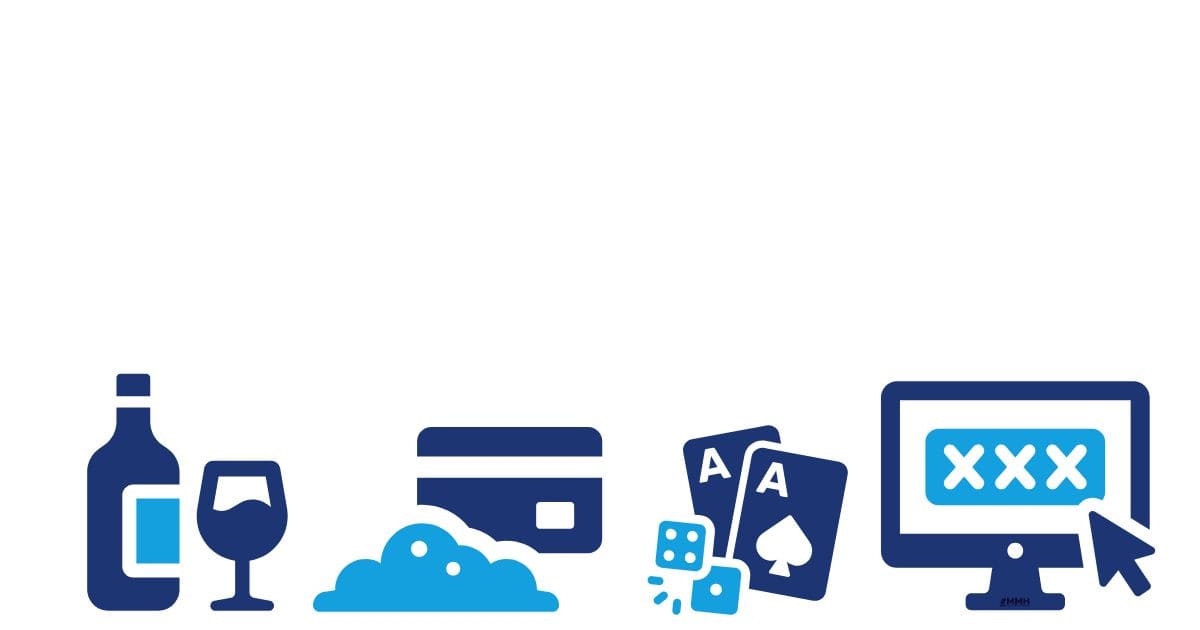MMH Men’s Mental Health does not provide direct mental health support. We do not offer crisis intervention, therapy, counselling, or medical advice. Instead, we provide information and signposting to external services that may be able to help.

Addictions
Feeling overwhelmed? You don’t have to go through this alone—help is available.
Need to talk?
Samaritans are here to listen, 24/7, 365 days a year. You can call them for free on 116 123 or visit www.samaritans.org
Prefer to Text?
Shout is a free, confidential, 24/7 text messaging support service for anyone who is struggling to cope.
If you feel in danger please call 999 or go directly to emergency services.
Breaking Free from Addiction: Understanding Its Impact on Men
Addiction can feel like an unbreakable chain, holding you back from living a full and healthy life. For many men, addiction affects not only physical health but also mental well-being, relationships, and self-esteem.
📌 Addiction isn’t just about substances—it can also involve behaviors like gambling, social media, and pornography, all of which can disrupt daily life.
If addiction is impacting your mental health, work, finances, or relationships, understanding the causes and symptoms can help you take the first step toward recovery.
How Addiction Affects Men’s Mental Health
Addiction is more than just a physical craving—it deeply impacts mental health. Men often face unique challenges due to societal pressures to be strong, independent, and in control.
🔹 Anxiety & Depression – Addiction can create a cycle of stress, anxiety, and depression, making it harder to break free.
🔹 Isolation & Loneliness – Many men withdraw from social connections, leading to further emotional struggles.
🔹 Loss of Self-Esteem – Feelings of guilt and shame can lower confidence and reinforce destructive behaviors.
🔹 Financial Stress – Addictions like gambling or substance use can lead to financial problems, increasing stress and anxiety.
🔹 Relationship Struggles – Addiction can strain friendships, family connections, and romantic relationships, leading to mistrust and emotional distance.
📌 Recognizing these impacts can help break the cycle and encourage seeking support.
What Causes Addiction?
Addiction doesn’t have a single cause—it often develops due to a mix of biological, psychological, and social factors.
🔹 Genetics & Brain Chemistry – A family history of addiction increases the likelihood of developing addictive behaviors.
🔹 Mental Health Conditions – Anxiety, depression, and PTSD can lead to self-medicating with substances or behaviors.
🔹 Stress & Trauma – Childhood trauma, high-pressure work environments, or personal crises can contribute to addiction.
🔹 Social Pressures – In some environments, drinking, gambling, or substance use is normalized as a way to bond or cope.
🔹 Accessibility – Alcohol, drugs, and social media are easily available, making overuse and addiction harder to avoid.
📌 Understanding the root cause of addiction is key to finding healthier ways to cope with challenges.
What Are the Symptoms of Addiction?
Addiction affects thoughts, behaviors, and emotions, making it difficult to control impulses. Common signs include:
🟠 Behavioral Symptoms
- Loss of control – Struggling to stop or limit addictive behaviors despite negative consequences.
- Neglecting responsibilities – Ignoring work, family, or personal obligations due to addiction.
- Withdrawal symptoms – Irritability, anxiety, or physical discomfort when unable to access the substance or behavior.
🟠 Psychological & Emotional Symptoms
- Cravings – Strong urges or compulsions to engage in the addiction.
- Mood swings & irritability – Increased frustration, anxiety, or emotional numbness.
- Guilt & shame – Feeling trapped in a cycle of self-blame.
🟠 Social & Financial Symptoms
- Social withdrawal – Avoiding friends, family, or activities that were once enjoyable.
- Financial strain – Spending excessive amounts on the addiction, leading to debt or money problems.
📌 Recognizing the symptoms early can help prevent addiction from escalating.
The Different Types of Addiction
Addiction takes many forms, affecting both mental and physical well-being. Here are some of the most common:
🟡 Cocaine Addiction
A powerful stimulant that creates intense highs followed by severe crashes. Regular use increases dependence, financial strain, and serious health risks.
Read More: Cocaine Addiction
🟡 Alcohol Addiction
Excessive drinking can lead to blackouts, relationship breakdowns, and long-term organ damage. Many men struggle to control their alcohol consumption.
Read More: Alcohol Addiction
🟡 Porn Addiction
Compulsive porn use can damage self-esteem, create unrealistic expectations, and impact relationships and sexual health.
Read More: Porn Addiction
🟡 Gambling Addiction
Uncontrollable betting can lead to financial ruin, emotional distress, and strained relationships. The urge to “win back losses” can be relentless.
Read More: Gambling Addiction
🟡 Social Media Addiction
Excessive scrolling and engagement on platforms like Instagram and TikTok can lead to anxiety, low self-worth, and lost productivity.
Read More: Social Media Addiction
📌 Addiction isn’t just about substances—behavioral addictions can be just as harmful.
🚨 Breaking free from addiction is possible with the right support. Seeking help is a sign of strength, not weakness.
Explore More
Addictions
- NHS Addiction Services: The NHS provides a variety of addiction services, including counseling, support groups, and medical treatment options.
- Mind: Offers support and resources for mental health conditions, including those resulting from addiction.
- GamCare: Provides support for those affected by gambling addiction, including counseling and a helpline.
- Alcoholics Anonymous (AA): A support network for those struggling with alcohol addiction, offering meetings and resources.
- Samaritans: Offers emotional support for those dealing with addiction-related stress, available 24/7.
While we aim to provide accurate and updated information, MMH Men’s Mental Health is not responsible for the quality, accuracy, or availability of external services linked on this page. If you notice a broken link or have a resource to suggest, let us know.
Taking Control: Steps to Help You Cope
You don’t have to do everything at once. Start with one step and build from there.
If your struggles persist or affect your daily life, consulting a professional is recommended.
Relapse Prevention Plan
Acknowledge the Problem
Seek Professional Help
Focus on healthy habits
Join Support Groups
You Are Worthy of Support.
There is no shame in needing support - everyone deserves help.
Take the next step:
Need to talk?
Samaritans are here to listen, 24/7. You can call them for free on 116 123 or visit www.samaritans.org
Prefer texting?
Shout offers free, 24/7 confidential support. Text ‘SHOUT’ to 85258 to start a conversation or visit
www.giveusashout.org
Explore More
Looking for guidance? Browse external resources on mental health, self-care, and well-being.
Support Groups
Find connection. Join an external support group and connect with others who understand.
